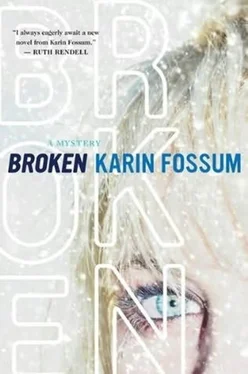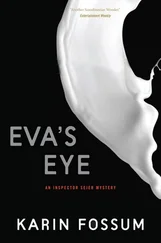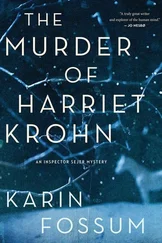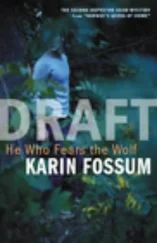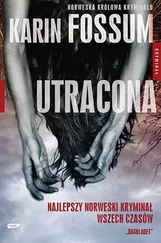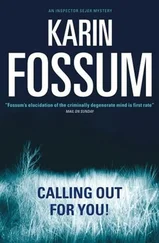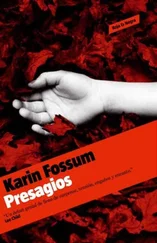I flick the ash off the cigarette and stare out of the window; the azalea by the entrance sways in the wind. I can't decide what fascinates me the most. His badly concealed eagerness, his spotless character, the light in his grey eyes.
'Dear God,' he says terrified, 'are you going to let me perish?'
The oak door opened and the bell rang out.
The bell had a fragile and wistful ring to it, which Alvar really liked. It announced that someone had arrived, someone who needed his expertise and his always impeccable service. He was sitting in the gallery's kitchen with a list of names. Krantz wanted to arrange a special exhibition in the new year, the preparations were underway, brochures would be printed and sent out to all their regular customers. Alvar looked through a pile of colourful photographs. The artist's best painting would adorn the cover together with a brief biography about his achievements so far. In this case, the artist being Knut Rumohr, these comprised fifteen large paintings, which were all outstanding. Alvar looked closely at the photos. He felt he could vouch for every single one of them and this was not always the case. Most artists were inconsistent. Rumohr, however, never disappointed and every painting was unique, there was strength and radiance in all of them. Besides, he was an unassuming man, private and polite, friendly and modest, a man after Alvar's own heart. He often visited the gallery wearing green wellies and with a sturdy sheath knife hanging from his belt. A craftsman, almost a labourer.
However, the bell had rung and Alvar looked up. On the left monitor he could see a woman entering. She was tall, slim and wore a dark coat. He let her wander around, it was not Alvar's style to charge in, the customer needed to be given time. His coffee had gone cold so he poured it into the sink. He went over to a mirror on the wall to check that his hair was in place. He looked at himself for a long time. His head was heavy, he took after his father. His features, however, were clean and fine, his dark brows strong and straight. He arranged his thinning hair across his scalp and then he went slowly down the stairs to the ground floor. She noticed him as he took the last few steps, nodded and smiled at him. A minute elegant nod of her head. She was an attractive, well-groomed woman, a little older than him, and, judging from her clothes, she was well off. She probably owned some works of art already. Alvar greeted her in a friendly manner, but remained standing, a little defensive, with his hands folded across his stomach. He did not recognise her, perhaps she had only recently moved to the town, or she might be passing through, he was not sure which, but he had a number of regular customers whose names he knew. Or the artists themselves popped in to see if anything was going on. He enjoyed talking to the artists. He had quickly made the discovery that the vast majority were down-to-earth, hard-working people.
However, here was a woman in a dark coat. She wore a foxtail around her neck and gloves of fine brandy-coloured leather. She wore boots with buttons. Alvar became almost besotted by them, they were black and pointy with high heels and, like his own shoes, polished to a shine. She continued to wander around; Alvar stayed in the background. It was easy for him to spot whether the customer had any knowledge of art. This woman stopped in front of a painting by Axel Revold, to Alvar's intense joy; however, the painting was so expensive that it was unlikely that she would be in a position to buy it. You do not sell a Revold just like that, a Revold is an event. So Alvar thought while he watched the woman furtively. She had moved on to a painting by Gunvor Advocat. An Advocat would be a respectable choice, too. But no, she carried on and after a few minutes she disappeared up to the first floor to the prints. He followed her, but went into the kitchen, he did not want to pester her with his enthusiasm. Because that was what he experienced at every sale: enthusiasm, selling a painting was like finding a home for a stray dog. A work of expressive art would finally find its place and give daily joy.
The woman seemed self-assured as well as determined. He could tell from looking at her that she wanted something specific and he felt quite sure that he would shortly secure a sale, because of the purposeful way she was moving around. While he waited, he followed her on the middle monitor. She walked from picture to picture, came back again, took a closer look, read the artist's signature, leafed through some brochures which lay on a table. Then she straightened up and approached a picture, stood calmly in front of it. At this precise moment Alvar got up from his chair and joined her. She had stopped in front of a work by Jon Be Paulsen. A small picture modestly priced. Alvar sold a great deal of Jon Bøe Paulsen, people liked his beautiful lines and a few even said, I like Bøe Paulsen, because at least I can see what it's meant to be. The pictures could resemble photographs; they were darkly lit and full of atmosphere. The print depicted a svelte, but graceful woman seen from behind. She had lifted up her long hair and was piling it up on the top of her head, so that her body arched and all her curves and muscles were clearly and attractively displayed.
He stopped behind her and cleared his throat.
'The appeal of Bøe Paulsen,' he said, 'is his gentleness. His delicate hand, his light strokes. No strong expression, but softness.'
She nodded and smiled at him.
'Yes,' she said, 'it's lovely. But it's not for me,' she added, 'I'm looking for a present for a friend who's turning fifty. She'll probably like this.'
She said this in a tone, which clearly indicated that her own taste differed. She did not dismiss the print, but it was not her type of art.
'Personally I prefer a somewhat stronger expression,' she admitted.
Alvar nodded.
'Have you seen the paintings by Krantz?' he asked, thinking that she might enjoy the strong latex pictures.
'Yes, they're impressive,' she said, 'but they won't last.'
Alvar agreed completely, but he did not say so. Ole Krantz's painting got your attention instantly, but what they had to say, they said in a moment.
She had made up her mind and decided on the print. As the picture was a present he took it downstairs to the workshop to gift-wrap it. He cut a piece of corrugated cardboard and folded it around the picture, then he wrapped it in tissue paper. Finally he covered it in wrapping paper and made a rosette from some gold ribbon. She paid with a credit card as people always did, then she said goodbye and Alvar was once more left to his own devices. If only Ole Krantz had heard that, he thought, that he won't last. On the other hand it was unlikely that he would have been offended, because Krantz did not consider himself to be a proper artist, more a decorator. Alvar poured himself another cup of coffee and pondered his lack of goodness once more. The thought kept returning and had now begun to torment him in earnest. Here he was sitting by the kitchen table enjoying a cup of coffee, he was at work, he performed his job well in every way, so why would he reproach himself on account of his absent goodness? He who had never hurt a fly.
He drank big gulps of coffee as his brain began to spin. Was there anything he could do about it? And if he were to do something, would that make the thought go away or would it grow worse? You could never be certain when it came to human psychology. After all, weren't there stories about aid workers who became totally caught up by all the misery they witnessed in foreign countries? They ended up consumed by despair at the world's bloodthirsty injustice and when they returned to Norway developed huge problems just eating a meal without feeling racked with guilt. He did not want his life upset like that.
Читать дальше
